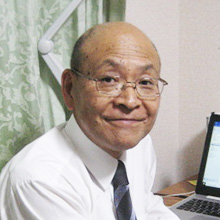It's an opportunity to start a new life

Graduated in March 2022 (11th batch)
Hiroshi Hasuike
What made you decide to enroll in graduate school?
In my case, I had more free time after I retired from my position, but at the same time, I started to think about what I wanted to do after retirement. I had the option of staying with the company, but I felt a strong desire to use my experience to work in public service, where I could provide management advice and help to various companies. To achieve this, I thought that if I obtained a qualification as a small and medium-sized enterprise management consultant, my opportunities would increase, so I began studying. Fortunately, I passed the first exam, but I felt that I would not be able to make use of the qualification unless I thoroughly understood the content, rather than just memorizing it, so I knocked on the door of a graduate school training program in the hope of learning from the basics.
Why did you apply to our Small and Medium Enterprise Management Consultant Training Program?
I first learned about the training program at Chiba University of Commerce because the first exam venue was at our university and there was a notice posted about the program. I also live along the Keisei Main Line, so it was easy to get to Kounodai Station, and my son was a student at the faculty, so I was grateful that they looked after each student very well and provided various follow-ups. I also visited Library once for a parent-teacher meeting, and the amount of books, the atmosphere inside and outside, and the attitude of the librarians were all overwhelmingly wonderful, so I felt that this was the university to study at. In addition, at the information session before enrollment, I was attracted by the fact that they have a well-developed alumni association and have a good relationship with many small and medium-sized companies, so I would be able to visit companies in various industries during my practical training.
Did you have any difficulties while in school?
Approximately half of the classes were online due to the COVID-19 pandemic. Although group work made it a little difficult to communicate, it made it easier to ask questions during class, so I felt that there were pros and cons. In face-to-face classes, the windows had to be left open, which let in the cold air in the winter, and in summer some students were bothered by the chorus of cicadas and the waves of mosquitoes in the evenings, so in summer it might be better to light a mosquito coil and sit on the hallway side (lol).
What is it that helps you?
In the seminar, we decide on the topic of our master's thesis in consultation with Professor, and we write the thesis while analyzing it from various angles. We also have our seniors and fellow members listen to our content and exchange opinions. Since I became a working adult, I have never had the experience of digging so deep into one topic and making arguments, so writing my master's thesis was a very rare experience for me. In the training program classes, I was able to hear the knowledge of senior diagnosticians as well as the experiences of lawyers and certified public accountants, which was very helpful and gave me a rough idea of what it would be like to work after graduation. And the most valuable thing is the bond with my fellow members. People from various industries gathered, and by naturally deepening my interactions with them in classes and practical training, I was able to broaden my perspective and reaffirm my position. All the members are still connected through a LINE group, which is a valuable source of information. On the practical side, there are several members of the Diagnostician Association among Professor, and after graduation, I was able to receive various information about work and stay connected.
What would you say to those who want to take the exam?
At the beginning, two years seemed like a long time, but when it was over, it went by in a flash. However, various programs were prepared within it, and I had the impression that by taking one step at a time, I had reached a high vantage point before I knew it. A large part of the tuition fees can be covered by the Professional Practical Education and Training Grant, and although there are classes on Saturdays and Sundays, you cannot take days off, but in return, you can feel a sense of fulfillment. People of all ages, both men and women, and people from various professions gather and learn together, which is very stimulating. In addition, there are multiple study groups available after completion, where you can exchange information and learn. For older people, age can be an advantage, not a disadvantage. I would highly recommend that you continue your education and use it as an opportunity to step up your life.